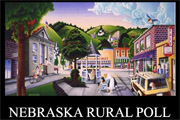Agricultural Economics, Department of

Nebraska Rural Poll
Date of this Version
9-2023
Document Type
Report
Citation
Nebraska Rural Poll Research Report 23-1, September 2023
Institute of Agriculture and Natural Resources, University of Nebraska-Lincoln
Abstract
This year, rural Nebraskans are more pessimistic about their current situation than they’ve been in the past ten years. The proportion believing they are worse off than they were five years ago was 27 percent, up from the 21 percent last year and 11 percent in 2021. This is the highest level since both 2003 and 2009, when 28 percent believed they were worse off. This increase in pessimism was matched with a decrease in optimism. This year, less than onehalf (45%) of rural Nebraskans believe they are better off compared to five years ago, down from 50 percent last year.
This trend continued when looking to the future. Rural Nebraskans’ optimism about the future has declined in the past four years. The proportion saying they will be better off ten years from now has always been greater than the proportion saying they will be worse off ten years from now. In fact, the gap between the two gradually widened between 2013 and 2019. However, that gap has narrowed considerably in the past four years. This year, rural Nebraskans’ optimism about their future is lower than last year. Just under four in ten rural Nebraskans (39%) believe they will be better off ten years from now. This is a decrease from 44 percent last year. The past four years have shown a steady decline from 52 percent in 2019 (the highest proportion across all years of this study). The proportion of respondents stating they will be worse off ten years from now increased compared to last year (from 22 percent last year to 27 percent this year).
The past four years have also seen an increase in feelings of powerlessness by rural Nebraskans. The past four years have been a period of steady decline in the proportions who either strongly disagree or disagree that people are powerless to control their own lives from 54 percent to 45 percent. The proportion of rural Nebraskans that either strongly agree or agree with the statement has steadily increased from 24 percent in 2019 to 34 percent this year.
Despite these trends, certain groups are more likely to be optimistic about their current situation as well as the future. Younger persons are more likely than older persons to believe they are better off compared to five years ago and will be better off ten years from now. Persons with higher household incomes and education levels are also most likely to be optimistic.
Education also is related to feelings of powerlessness. Persons with lower education levels are more likely than persons with more education to believe that people are powerless to control their own lives.
Most rural Nebraskans describe their mental health or emotional well-being as good (55%) or excellent (28%). Income was also related to positive reports of their mental health.
When looking at the workforce and economy, most rural Nebraskans are confident that completing an apprenticeship program, having an associate degree or certification, and having a bachelor's degree can all lead to a good job. However, more agree that completing an apprenticeship program can lead to a good job. And, as compared to last year, rural Nebraskans are less pessimistic about the economy. The proportions of rural Nebraskans saying that various economic items will get much worse in the next 12 months was less than it was in 2022. However, despite the decreased pessimism, most rural Nebraskans still expect the majority of these items to get worse during the next year.
Included in
Agribusiness Commons, Agricultural and Resource Economics Commons, Civic and Community Engagement Commons, Community-Based Research Commons, Demography, Population, and Ecology Commons, Entrepreneurial and Small Business Operations Commons, Place and Environment Commons, Public Affairs, Public Policy and Public Administration Commons, Regional Economics Commons, Rural Sociology Commons

